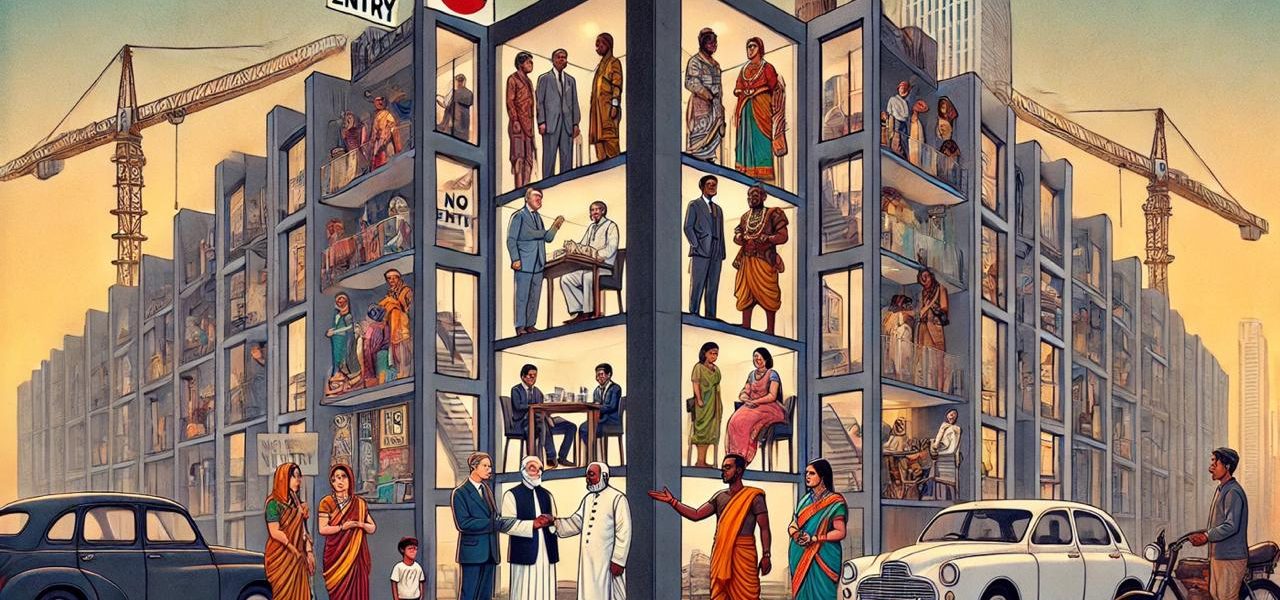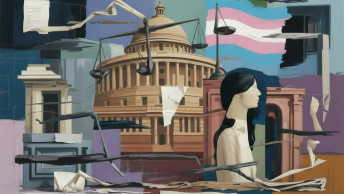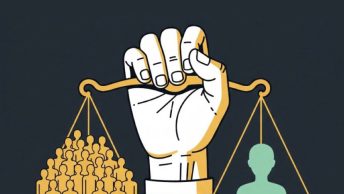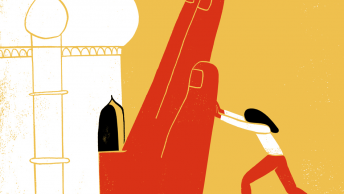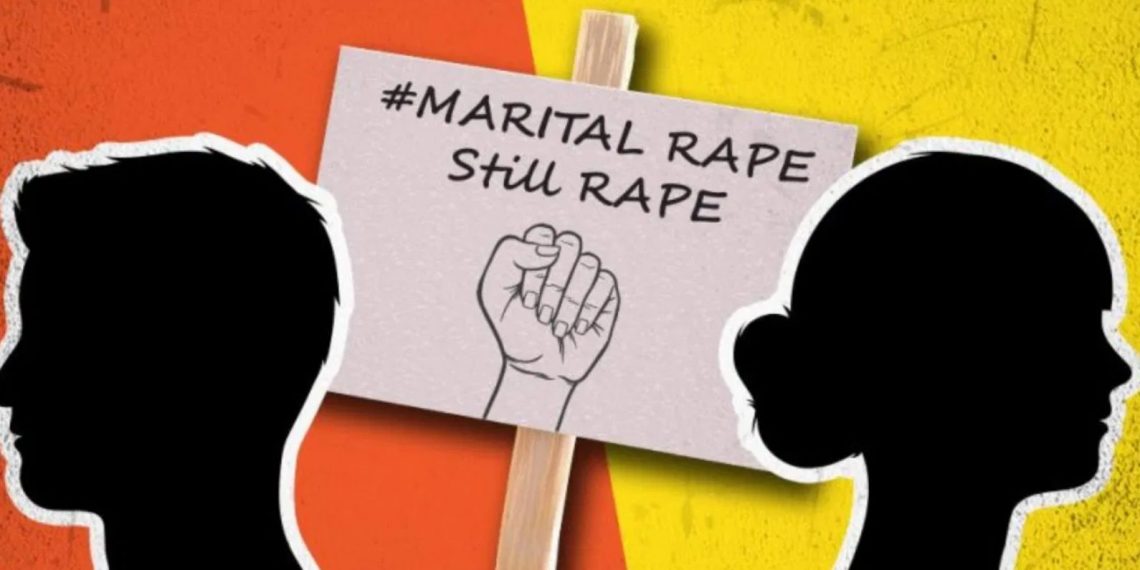In December 2024, a Muslim couple in Morabadad was forced to sell their house after continuous protests by the neighbours of the housing society. Remarkably, this happened despite a perfectly valid sale between the seller and buyer. This follows a long line of cases in recent years where the transfer of property is mediated by discriminatory practices on the grounds of religion, caste, etc.
The present blog post aims to situate the issue in the landscape of a broader clash between two competing visions relating to India’s future, one based on the ideas of Carl Schmitt and another on Ambedkar’s.
Carl Schmitt versus B.R. Ambedkar
At the surface, it is difficult to see the connection between a conservative German constitutional scholar, writing in the decade before the rise of the Nazi party and later siding with it, and the architect of the Indian Constitution. However, as Alok Prasanna Kumar brings out, Carl Schmitt and B.R. Ambedkar had antithetical views about popular sovereignty and the working of a liberal democracy. Housing discrimination is a revealing site to explore this contestation of ideas.
Schmitt argued that identification of an ‘enemy’ is essential to politics. In uniting against an enemy, the ‘people’ constitute and assert their own political identity. The friend-enemy distinction, for Schmitt, is not superficial but deeply rooted in political life. In his view:
The utmost degree of association is the willingness to fight and die for and together with other members of one’s group, and the ultimate degree of dissociation is the willingness to kill others for the simple reason that they are members of a hostile group.
Schmitt argued that the divide is integral to political life. Without such existential stakes, he believed, life would be shallow and meaningless. He used this understanding to attack liberalism for its emphasis on universalism and neutrality, which undermines the political by failing to draw a clear distinction between friends and enemies.
Standing in sharp contrast to Schmitt’s searing appraisal of liberal democracies is B.R. Ambedkar’s endorsement of fraternity. Aakash Singh Rathore’s work on the Indian Preamble reveals that ‘it was Dr Ambedkar who personally added the word ‘fraternity’ to the Preamble.’[1] The term was conspicuously absent in Nehru’s Objectives Resolution, B.N. Rau’s draft Constitution and different alternative constitutions as well.
Like Schmitt in his own context, Ambedkar recognized the presence of divisive forces in the Indian context. However, while for Schmitt, division was an essential fact about political life, for Ambedkar, it was something standing in the way of building a nation. As Farrah Ahmed notes, fraternity was seen as a response to the existence of multiple identities (along religious, caste and class lines) in India. The idea of fraternity sought to cultivate a bond of common citizenship in the face of differences.
In sharp contrast to Schmitt’s notion of democracy which rested on homogeneity and otherization, Ambedkar emphasized the impossibility of building a democratic nation state without fraternity. Indeed, in many of his writings, he revealed an inextricable link between democracy and fraternity (“fraternity…is only another name for democracy”, “fraternity…is the root of democracy”).[2]
What one saw as the lifeblood of democracy was seen as its greatest threat by another. For Ambedkar, the real threat to society lay not in rejecting Schmitt’s friend-enemy distinction, but in allowing such divisions to fester. Ambedkar realized that omission in this regard would tear apart our social fabric and corrode the promise of constitutional liberation.
Schmitt’s Shadow: Gujarat Housing Law and Exclusion
Within the context of housing discrimination in India, the reverberations of the friend-enemy distinction can be heard in the hugely controversial legislation in Gujarat called The Gujarat Prohibition of Transfer of Immovable Property and Provision for Protection of Tenants from Eviction from Premises in Disturbed Areas Act, 1991 (hereinafter “the Act”). Enacted initially as an ordinance in the backdrop of communal conflicts, the Act seeks to prevent distress sales in ‘disturbed areas.’
In 2020, the Gujarat Government had amended the Act to make it more stringent but the same was partially stayed by the Gujarat High Court in 2021. Last year, the State Government decided to withdraw the amendment. While the original idea of the law was to safeguard free consent, many have documented how the law has been weaponized to push for greater ghettoization of Muslims by making it difficult for them to get property in ‘Hindu’ areas.[3] This bears testimony in a common misconception shared by the residents that the Act ‘prohibits the sale of properties from one community to another.’ Instead of addressing the issue of housing discrimination, the Act has legitimized segregation and sharpened the communal divide.
Akin to Schmitt’s assessment, discrimination in the housing sector rests on a specific understanding of how society ought to be organized naturally. Scholars have highlighted how the Act reinforces ‘a fundamental belief that Muslims and Hindus should stay separately’. This description applies to housing discrimination in India generally. A person’s identity as a member of a particular group is in itself seen as a reason to exclude.
The law also brings to the fore the fact that Schmitt’s divisive vision is not theoretical but finds troubling parallels in the contemporary Indian legal landscape.
Conclusion- Rediscovering a Preambular Value
“Without fraternity, equality and liberty will be no deeper than coats of paint.”
While introducing fraternity in the Indian Constitution, Ambedkar alluded to the problems of religious and caste divisions in India. Both of these have manifested themselves in housing discrimination and threatened to break the thread connecting different segments of society. The rise of segregated living has to be seen in the context of a reality where exclusion spans across various facets of social life including employment, politics, etc. The enduring temptation of Schmitt’s divisive worldview has to be resisted with Ambedkar’s unequivocal endorsement of fraternity. Revival of this preambular value seems indispensable for building a truly inclusive society while transcending the public-private divide.
Prof. Alind Gupta is a graduate of NLUD, holding PG from NLSIU, and is currently an Assistant Professor at UPES Dehradun. He teaches Legal Methods and the Transfer of Property Act.
[Ed note: The piece was edited by Hamza Khan and published by Baibhav Mishra from the Student Editorial Team.]
[1]Aakash Singh Rathore, Ambedkar’s Preamble: A secret history of the Constitution of India (Chapter 4- Fraternity: Affection for Everyone, Hatred for None).
[2] Ibid.
[3] Even on its own terms, it is difficult to appreciate the need for such a law. Attestation by two witnesses is commonly done for all the transfers. Additionally, sale of an immovable property is required to be mandatorily registered in practically all the cases. Under Section 34 of the Indian Registration Act, 1908, the sub registrar is duty bound to authenticate proper execution of the transfer document as well as the identity of the executants, who are required to be present before the registering officer.
Instead of adding another bureaucratic hurdle causing additional delay, strengthening the pre-existing mechanisms would be a better way to safeguard free consent in transfers. In 2020, the Gujarat Government did pass a bill fortifying the registration law to, among other things, empower the registering officer to not register ‘document relating to transaction which is prohibited by any existing Central Act or State Act for the time being in force’. However, it seems the bill is yet to receive assent.

